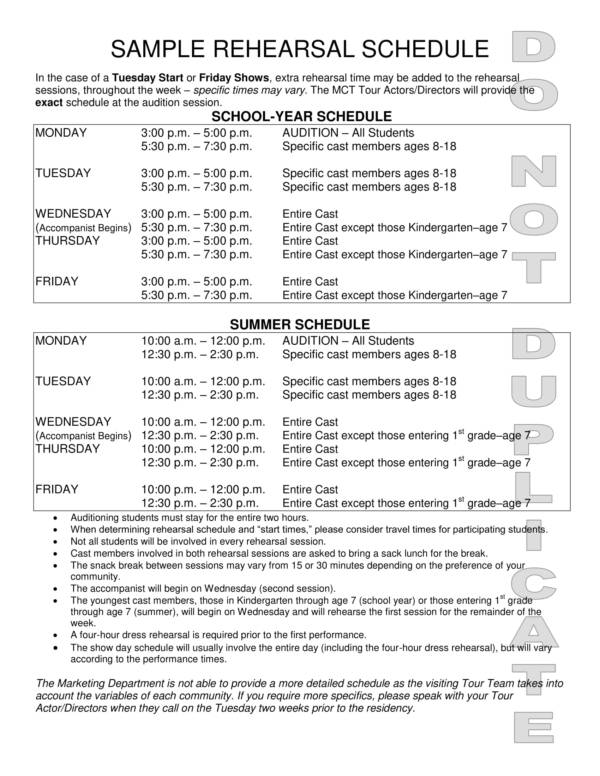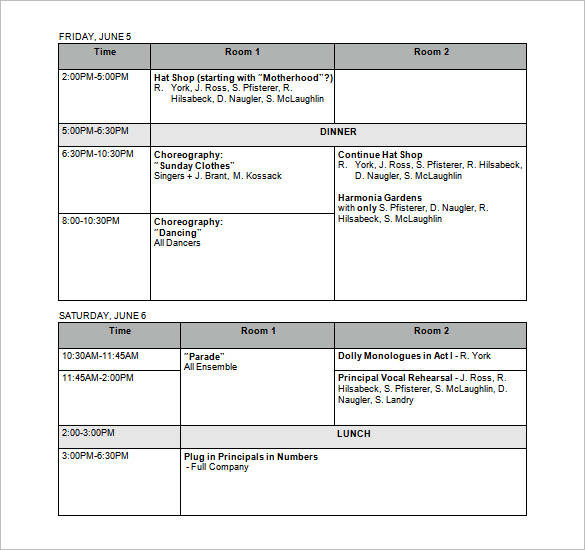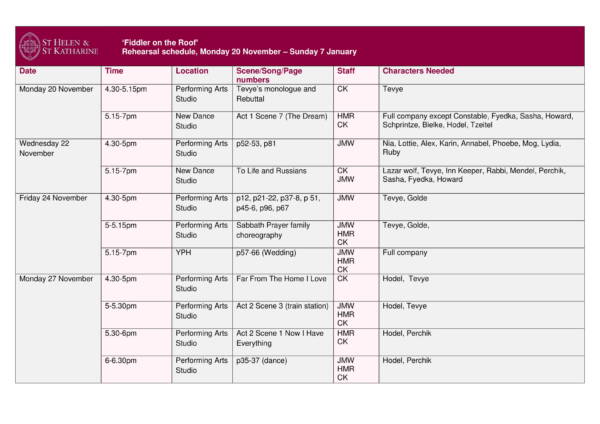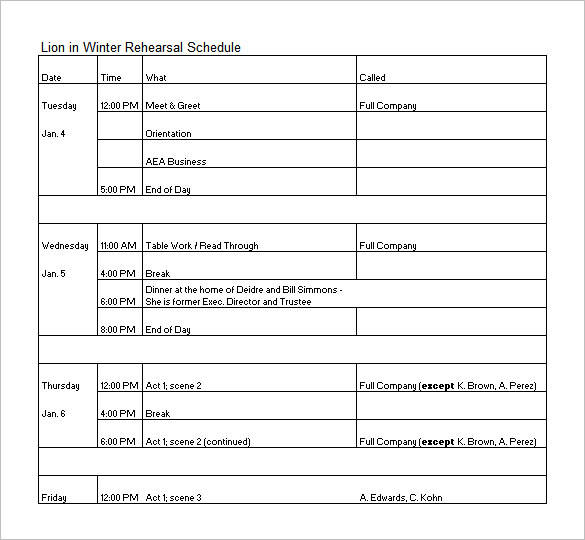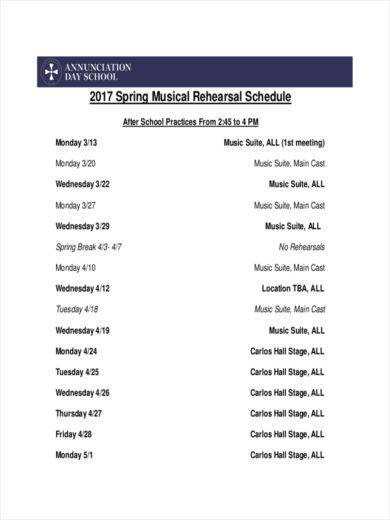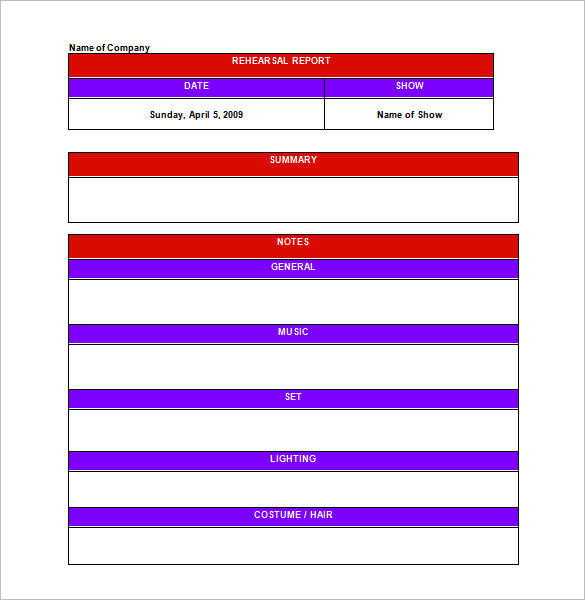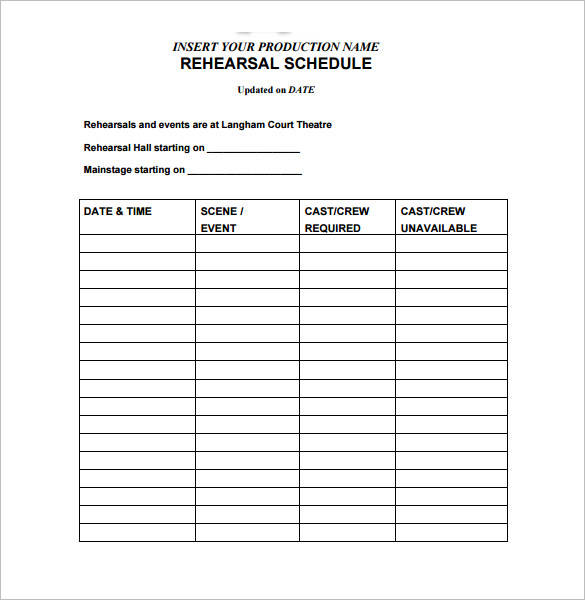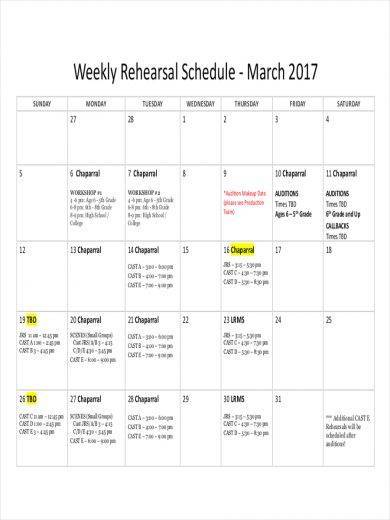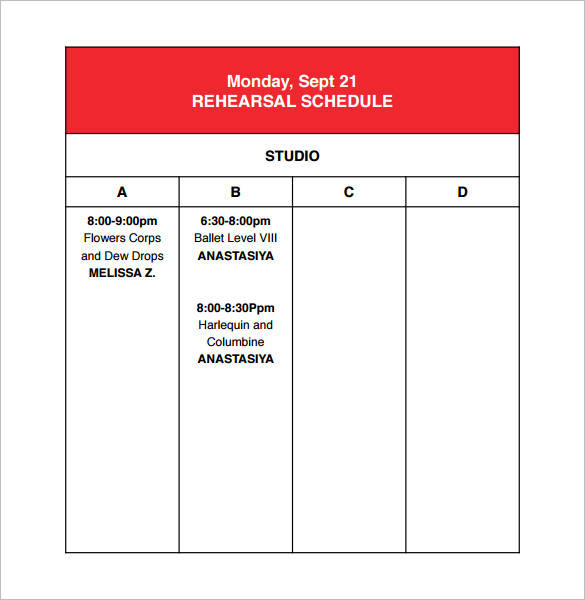What does a play, concert, speech, or any presentation have in common? They are often practiced to deliver a spectacular performance in the end. One notable process is a rehearsal, which is defined as the preparatory practice for a performance presented in any event or occasion. The thing is, doing good in rehearsals makes you feel confident with the final play. Although rehearsals are common, some do it poorly, especially with poor time management. Be sure to plan with a schedule in mind to ace the performance. And you may do so with easy-to-use rehearsal schedule sample templates.
Rehearsal Schedule Template
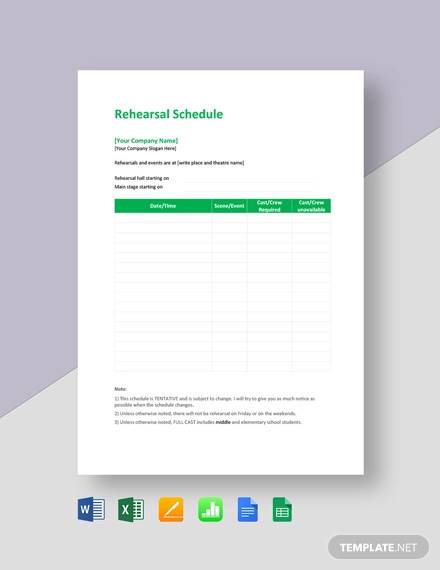
School Rehearsal Schedule Template
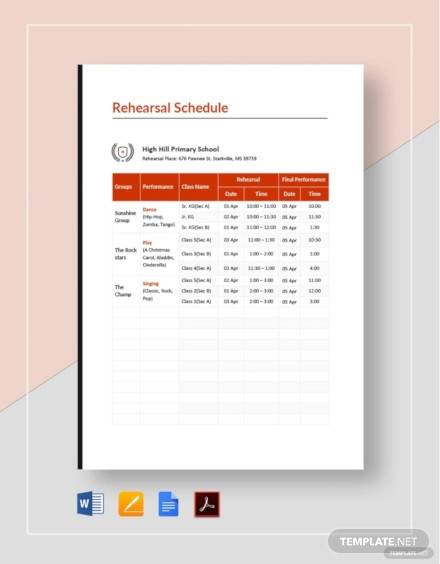
Sample School Rehearsal Schedule
Weekly Rehearsal Schedule Template
Simple Rehearsal Schedule Sample
Winter Rehearsal Schedule Template
Musical Rehearsal Schedule Sample
Music Rehearsal Schedule Template
Sample Schedule for Evening Rehearsal
Printable Production Rehearsal Schedule Template
Weekly Rehearsal Schedule Sample
Studio Rehearsal Schedule Template
What Is a Rehearsal Schedule?
In the entertainment and performing arts industry, rehearsals are no stranger. They are essential to practice performances and be familiar with the venue and stage during a show. A rehearsal is crucial in aiming for perfection with the final delivery, like in performing in front of an audience. But rehearsing in random is discouraged. There should be a thorough plan in the scheduling process too. In fact, rehearsals must be scheduled a couple of days or weeks before the actual performance. Thanks to rehearsal schedules, many factors are tracked—who were rehearsing, how many minutes or hours the rehearsals took, etc.
How to Make an Excellent Rehearsal Schedule
It is expected that you prevent issues and conflicts by creating effective and useful schedules. And that should be your main objective in crafting a rehearsal schedule. Remember that you would want your final performance for any event or business to be superb. So, do not just settle for a poor or mediocre rehearsal plan. In just five steps, you can already form an excellent rehearsal schedule.
Step 1: Know Your Performance and Write the Details
First of all, what are you planning to present or perform? Are you rehearsing for a theater or perhaps, a business presentation? Whatever your plan is, you must be specific. If you do a musical drama rehearsal, you should already know when the final presentation is, who will be part of the performance, where to present, and more. This step should answer the important who, what, when, where, why, and how questions, including some instructions. Lacking information and misinformation are common flaws of a plan, so do not let them be.
Step 2: Observe an Achievable Plan
Next, decide the critical factors. How many hours should every rehearsal be done? And shall rehearsals be done weekly, biweekly, or any other schedule? Other factors include where rehearsals must take place. Since you already wrote the details about your performance in step one, pick out the essential parts of your list that should be prioritized. This step helps you organize the flow of your plan. And after that, check if your plotted plan is achievable. Create adjustments if needed.
Step 3: Be Versatile for Changes
After detailing the rehearsal schedule, work on its versatility. During rehearsals, there could be changes like if an emergency rehearsal is necessary or perhaps, some people could not make it, so a rehearsal should be canceled. And the same goes for changing how performances are done, including the tech and stage management. For any change involved, be prepared and stay flexible. But, there are limits too. Do not come up with various changes all the time, especially when last-minute changes could ruin the final performance.
Step 4: Make the Schedule Presentable and Easy
Any schedule must be presentable, yet it does not imply that its output should be too colorful or grand. Present in a way where it is readable, understandable, and workable. Also, focus on making the rehearsal schedule easy. Simple words would suffice to prevent confusion. Most importantly, ensure that everyone involved in the performance has read and known about the schedule. Commit to the plan, no matter what.
FAQs
How long does it take to rehearse plays?
Rehearsing for a play usually takes around four to six weeks, but that may depend on how great or simple the play is. It may take longer for bigger shows, like Broadway musicals. As long as everything is planned carefully, rest assured it will go well.
Who should organize the rehearsal schedule in a production?
Generally, theater managers are in charge of rehearsal schedules. The same goes for anyone assigned in dealing with the audience during production. And with fillable templates available, you can easily fill in every blank to make a rehearsal schedule in no time.
What is a polishing rehearsal?
A polishing rehearsal refers to the last stage of a rehearsal, meaning it marks the final practice before the main presentation. And by polishing, the final changes and decisions shall be made to ensure nothing goes wrong in the main performance.
Indeed, practicing and rehearsing can be tiring. In fact, a lot tiring if you add planning a rehearsal schedule to your workload. But do not forget the effects of well-planned rehearsal schedules. Once made, everything will be tailored to each rehearsal already. No performer or staff would have to ask what to do. Since easy-to-use templates are for grabs, the process is sure to be simple—meaning you can make rehearsals fun already. Download and enjoy now!
Related Posts
FREE 10+ Employees Schedule Samples in PDF
FREE 10+ On Call Schedule Samples in PDF
FREE 10+ Time Block Schedule Samples in PDF
FREE 10+ Gym Schedule Samples in PDF | MS Word | Apple Pages | Google Docs | Keynote |
FREE 10+ Daily Hourly Schedule Samples in PDF
FREE 10+ Weekly Schedule Template with Hours Samples in PDF
FREE 10+ 7 Day Weekly Schedule Samples in PDF
FREE 10+ Working Schedule Template Samples in PDF
FREE 6+ Preschool Schedule Template Samples in PDF
FREE 10+ Daily School Schedule Samples in PDF | MS Word | Google Docs | Google Sheets | Excel
FREE 10+ Day Schedule Samples in PDF
FREE 10+ Daily Work Schedule Samples in PDF
FREE 10+ 24 Hours Schedule Samples in PDF | Word | Google Docs | Google Sheets | Excel | Apple Numbers | Apple Pages
FREE 10+ Baseball Schedule Samples in PDF
FREE 10+ Availability Schedule Samples in PDF

